The National Institutes of Health (NIH) has awarded nearly $470 million to researchers who will study the long-term impacts of COVID-19 among thousands of patients.
This grant will go to New York University (NYU) Langone Medical Center, which will act as the central hub for long Covid research and provide smaller grants to more than 100 scientists.
The $470 million represents about 40 percent of $1.15 billion that Congress allocated for long Covid research in the American Rescue Plan.
NIH director Dr Francis Collins says the award is a major step for tens of thousands of long Covid patients in the U.S., many of whom ‘have had their lives completely upended by the major long-term effects of COVID-19.’
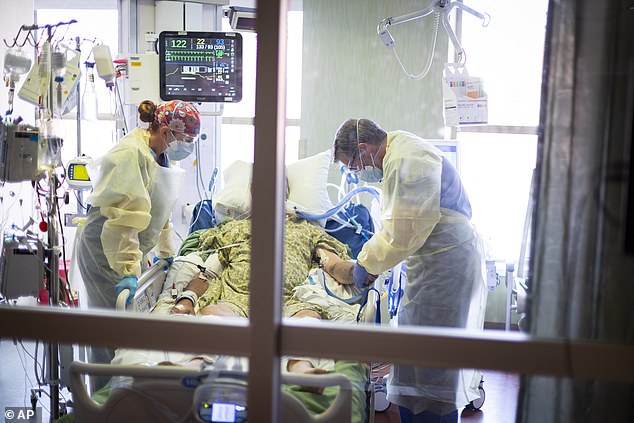
Covid symptoms can last long after an initial infection – or an initial trip to the hospital – for many patients who develop long Covid. A new research grant will enable scientists to discover why. Pictured: A Covid patient in the ICU at a Boise, Idaho hospital, August 2021
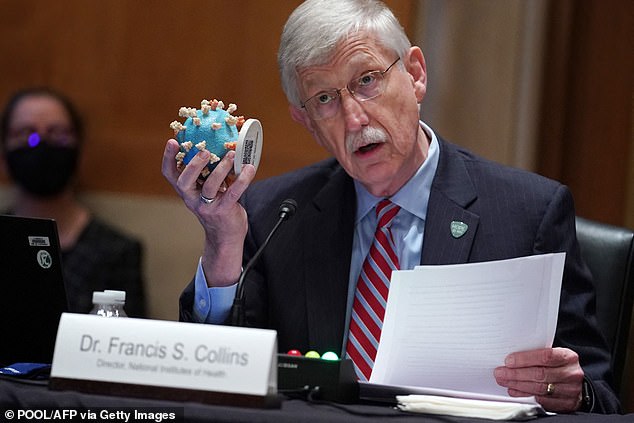
Dr Francis Collins, director of the NIH, said that the long Covid research funding is a major step for patients who ‘have had their lives completely upended’ by the virus. Pictured: Collins holds up a coronavirus model while testifying on Capitol Hill, May 2021
In February 2021, the NIH announced a new initiative to study long Covid, the condition in which patients have prolonged symptoms for weeks or months after their coronavirus infection.
These symptoms can include neurological issues like fatigue and brain fog, shortness of breath, chronic cough, anxiety and depression, gastrointestinal issues, and many others.
According to NIH estimates, between 10 and 30 percent of people infected with the coronavirus will experience long-term symptoms.
Some long Covid patients who originally contracted the virus in spring 2020 are still experiencing symptoms.
The condition may even be possible after vaccination, recent studies have shown – though the risk of long Covid is much lower for vaccinated people who experience a breakthrough case.
The NIH effort to study this condition – called the RECOVER Initiative – has received $1.15 billion in funding over four years from Congress, via the American Rescue Plan.
After months of limited news about the RECOVER Initiative, the NIH announced on Wednesday that it’s awarded nearly $470 million in a research grant to study long Covid.
‘We know some people have had their lives completely upended by the major long-term effects of COVID-19,’ said Collins.
‘These studies will aim to determine the cause and find much needed answers to prevent this often-debilitating condition and help those who suffer move toward recovery.’
The hefty award went to NYU Langone Medical Center, which will award smaller grants from that $470 million to over 100 researchers at over 30 institutions, the NIH announced.
These institutions intend to leverage existing long Covid research efforts and recruit new patients into study group encompassing tens of thousands.
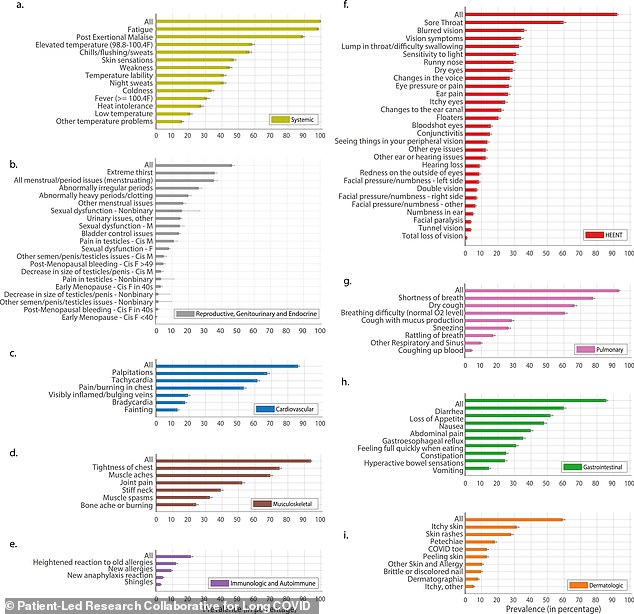
Long Covid patients experience a wide range of symptoms ranging from fatigue and fever to muscle aches, diarrhea, and heightened reactions to allergies, a patient survey found
Scientists plan to collect a wealth of data on the RECOVER Cohort. This includes clinical information, lab tests, and analysis of patients’ stages of recovery.
‘This scientifically rigorous approach puts into place a collaborative and multidisciplinary research community inclusive of diverse research participants that are critical to informing the treatment and prevention of the long-term effects of COVID-19,’ said Dr Gary Gibbons, one of the co-chairs of the RECOVER Initiative.
In developing the RECOVER Initiative’s protocols, the NIH worked with researchers who have already been studying long COVID as well as patients themselves.
Patient groups like Body Politic have advocated for scientists to include diverse groups of long Covid patients in their research – including those who were not hospitalized or didn’t obtain a positive test result.
Many long Covid patients who were infected early in the pandemic were unable to get tested due to limited testing supplies and other access issues, excluding them from some later studies.
The RECOVER Initiative intends to include a diverse group of adults, children, pregnant people, and patients in different stages of their Covid infections.
Patients who would like to volunteer for the initiative can sign up at an NIH website, recovercovid.org.
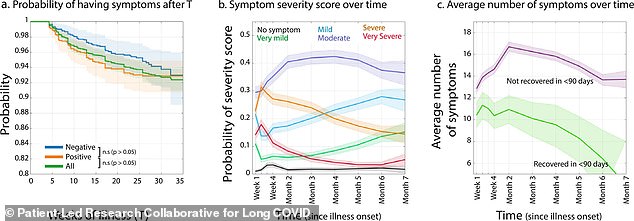
Many long Covid patients experience symptoms for seven months or more
The NIH initiative also aims to standardize clinical trial designs, ensuring that researchers at different institutions analyze data in the same way.
Researchers will use electronic health records as well as mobile health tech, such as smartphone apps and wearable devices, to track patients.
Through the initiative, NIH scientists aim to determine what exactly causes long Covid – a question that has yet to be definitively answered.
‘Is it a misfiring of the immune system that fails to reset after the infection with this coronavirus? Is it a triggering of some metabolic dysfunction? We don’t know,’ Collins said at a media briefing on Wednesday.
‘The diversity of symptoms and presentations leads us to believe that long Covid is not just one condition.
‘The only way, therefore, we’re going to sort this out is with very large studies that collect lots and lots of data about symptoms, physical findings and laboratory measures.’
NIH scientists also intend to better understand the range of long Covid symptoms, risk factors for the condition, and possible treatments.
‘Given the range of symptoms that have been reported, intensive research using all available tools is necessary to understand what happens to stall recovery from this terrible virus,’ said Dr Walter Koroshetz, also a RECOVER co-chair.
The NIH also recently awarded smaller long Covid research grants to the NYU Grossman School of Medicine and the Biostatistics Center at Massachusetts General Hospital.
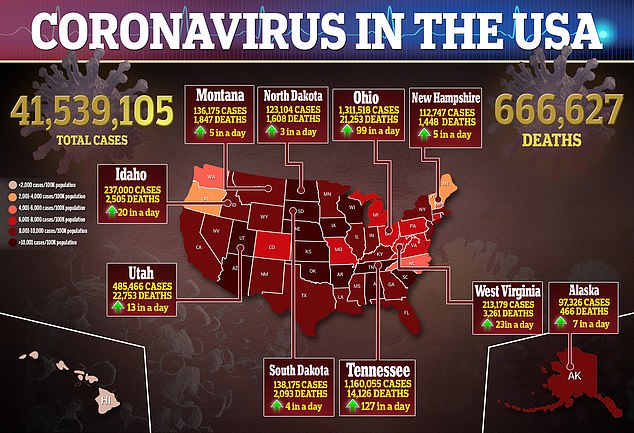
Source link : https://www.dailymail.co.uk/health/article-9998391/NIH-awards-470-million-researchers-study-effects-long-Covid.html











